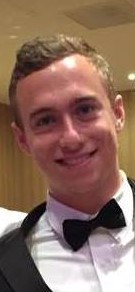Meet the New AHA Intern: William Gogoel

Please welcome the new legal intern with the Appignani Humanist Legal Center, William Gogoel!
TheHumanist.com: What is your educational and work background?
During high school I worked various jobs over the summers, from temping in a paint lab to carpet removal and installation. For college I went to James Madison University, where I received my BA in philosophy. Because I was entertaining a legal career, I then got a job as a law clerk at a boutique firm in Alexandria, Virginia. I worked there for over a year, and in the process became deeply interested in legal practice. Consequently, I began attending George Washington University Law School.
I’ve had the following jobs since attending law school: last summer I worked at the general counsel’s office of a federal agency, where I dealt mainly with employment litigation, and this past spring I did some work on civil litigation cases at the same boutique law firm that I worked at before law school.
TheHumanist.com: How did you first learn about humanism?
 I first learned about humanism through philosophy, specifically in the context of an existentialism class. Perhaps the most concise statement of existentialism is “God is dead”, meaning there are no universal values handed down from on high. In light of this, existentialists demand that we assert our own values, with the only slight problem of actually developing the values we wish to assert. This stage is where I became interested in humanism and humanist values, as it already entails a lack of religiosity in determining values, and it bases values in rationality and empathy. I could not imagine a stronger basis for developing values.
I first learned about humanism through philosophy, specifically in the context of an existentialism class. Perhaps the most concise statement of existentialism is “God is dead”, meaning there are no universal values handed down from on high. In light of this, existentialists demand that we assert our own values, with the only slight problem of actually developing the values we wish to assert. This stage is where I became interested in humanism and humanist values, as it already entails a lack of religiosity in determining values, and it bases values in rationality and empathy. I could not imagine a stronger basis for developing values.
TheHumanist.com: Did you grow up in a traditional religious faith? How did it impact you?
I grew up in a Catholic household, one in which church and religious classes were attended every Sunday, and every male child was required to serve as an altar boy. During that time I never questioned the religion because it was never presented to me as a question or a choice, but as a fact. Once I was old enough to be exposed to other viewpoints, and to actually analyze the claims of the church, I quickly fell out of that tradition.
In terms of impact, I felt deeply betrayed by my parents for presenting as factual something that they later admitted to knowing was at best extremely dubious. Because of this, I have become a much more skeptical person, and typically don’t believe anything without being presented with hard evidence first.
TheHumanist.com: What interested you most about working for the American Humanist Association?
I was interested in working for the AHA because I wanted to gain exposure to the practice of public interest law, and specifically to the practice of public interest litigation. Also, as an atheist, the mission of the AHA is one that is close to my heart
TheHumanist.com: What book has influenced you the most?
The Brothers Karamazov by Fyodor Dostoevsky has had the biggest impact on my everyday thinking. What’s funny is that I only vaguely remember the plot but remember in detail the short allegorical stories told by the main character’s brother, Ivan. These stories have wide applicability, and I remember them often when thinking about certain topics or when confronting certain decisions in my life.
TheHumanist.com: If you could have dinner with any three people in the world (living or dead), who would they be and why?
First would be Hunter S. Thompson. He seemed to be an intelligent and eminently interesting person from whom I could learn a lot about enjoying life.
Second would be Kemal Ataturk. He founded modern Turkey as a progressive, secular state—a tradition that was maintained until recently with the rise of Recep Tayyip Erdogan and his AKP party. I would like to ask Ataturk about the aspirations he had for Turkey’s future, and how current events may affect those goals.
Third would be Nikola Tesla. I would like to talk to him about his method of designing his engineering projects, by which he could visualize how the mechanisms would work together and could sort out all of the kinks before any actual materials were used. In doing so, I would hope gain a view into a unique form of abstract problem solving.
